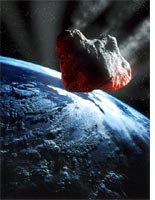Hope they don't have a screw-up and redirect it right at earth! Space programs never have been a 100% sure thing.
http://tinyurl.com/yhbvyuf

the message board for Dubai English speaking community




canuckbid wrote:No I believe its 2036. Since they can only track 70% of the sky we could get smacked with something at any time. They do not even look for ones the size that hit Russia in the fifties. They are too small. They are looking for the "planet killers" May as well have your bowl of cornflakes in the morning and carry on. The experts say you will get about a 10 secomd warning. They'll be noisy coming through the atmosphere.
Dr Strangeglove wrote:canuckbid wrote:No I believe its 2036. Since they can only track 70% of the sky we could get smacked with something at any time. They do not even look for ones the size that hit Russia in the fifties. They are too small. They are looking for the "planet killers" May as well have your bowl of cornflakes in the morning and carry on. The experts say you will get about a 10 secomd warning. They'll be noisy coming through the atmosphere.
70% ??? I recently read that when it comes to tracking non-stellar objects, all governments combined add up to less than 4%. In fact, due to the staggering speeds at which asteroids and comets can sometimes travel, even if we spotted an object, we would have little time to do anything preventative anyway, even if we had the technology, which currently we do not.
However, before people start building underground bunkers and stocking them with cheese and chive Pringles, it's worth noting that space is really really really big. Almost uncomprehendingly big. So whilst there might be a lot debris flying around, luckily for us, most of it never has a chance of coming anywhere near us. Let me give you an illustration of the scale of just our solar system.
Far from being like the school model we were all taught about, our system is massively spread out at exponentially vast distances. To put it to scale, imagine that the Sun is an orange on your desk. Mercury, would be the size of a fleck of dust and would sit about 6 inches away from your orange sun. Then Venus, barely bigger than Mercury would be about another 12 inches away, and this is where it starts to get interesting (if you're a bit of a nerd), whilst the Earth would only sit a few metres away from Venus (in scale), Mars would be way across the other side of the street, up to 50 metres away. Saturn, Mars' neighbour, is 1.2 KILOMETRES (in scale) from Mars and so it goes. It starts to get a bit ridiculous after that. Until you get to Neptune, (so remember, if Mercury is 6 inches away) Neptune is the distance from Dubai to Abu Dhabi. I shan't mention Pluto as it's no longer classified as a planet.
So there you have it. Lots and lots of empty space and more importantly, lots of celestial bodies with gravities greater than ours. You're more likely to be hit by a car whilst travelling at 30,000 in a jet, than you are to be hit my a comet.
Dr Strangeglove wrote:Next week: Why the cattle prod is mightier than the sword....

canuckbid wrote: We should be colonizing other planets just in case. If we want the human race to continue.

